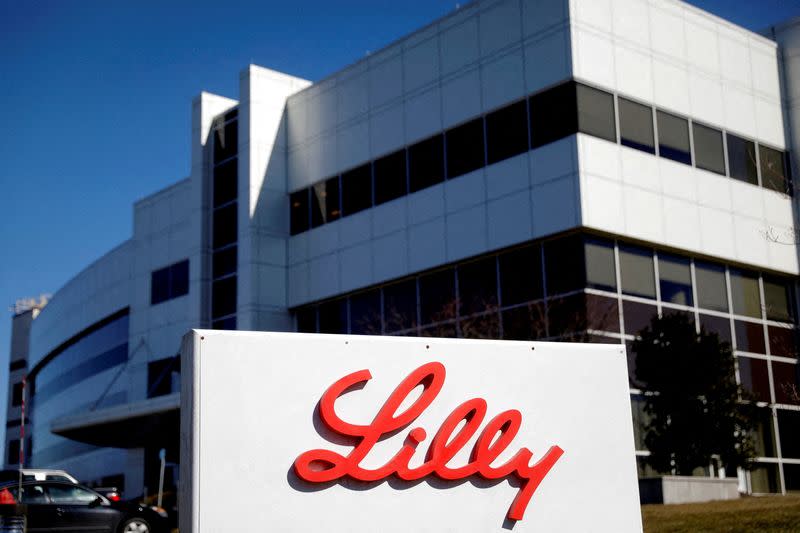Lilly weight-loss drug Zepbound gets US, UK approval to rival Wegovy

By Patrick Wingrove and Bhanvi Satija
(Reuters) -U.S. and UK regulators both gave the thumbs up to Eli Lilly's weight-loss treatment called Zepbound on Wednesday, paving the way for a powerful new rival to Novo Nordisk's Wegovy in addressing record obesity rates.
The two drugs are the most effective treatments for weight loss approved to date and will compete in a global market estimated to be worth $100 billion by the end of the decade.
Novo's drugs have helped patients lose significant amounts of weight and altered the landscape for sellers of sugary foods and beverages, as well as healthcare providers with products used to manage obesity-related conditions like diabetes and sleep apnea and makers of devices used for bariatric weight-loss surgeries.
Drugmakers have also been criticized for the high cost of the medicines that make it unaffordable for many who suffer from obesity.
Lilly's drug tirzepatide has been available as Mounjaro for type 2 diabetes since 2022 and had increasingly been used "off-label" for weight loss while the obesity approval was pending. It will be on U.S. shelves under the brand name Zepbound later this month, and in the U.K. "sooner rather than later," the company said.
Zepbound will list at $1,059.87 a month, according to Lilly. That compares with a list of $1,349 per-package for Novo Nordisk's wildly popular weight-loss drug Wegovy. Novo has had to limit the number of patients who can get the treatment due to supply constraints.
Morningstar analyst Damien Conover said despite the lower list price than Wegovy, what really matters is the after-discount net prices negotiated by pharmacy benefit managers.
Wegovy's net price is between $700 to $900 per month, according to the healthcare benefits consultant Aon's employer guide on how to manage the cost of weight-loss drugs.
Novo Nordisk is also set to present new cardiometabolic disease data, including results from its SELECT trial, at the annual American Heart Association Scientific Sessions from Nov. 11-13. The data could help push Wegovy beyond its image as a lifestyle drug among payers.
Still, Conover said, Zepbound's approval "sets the drug up to be one of the best-selling drugs of all time."
Zepbound will not be on U.S. insurance coverage formularies at the beginning of 2024, but that will ramp up over the course of the year, Lilly said.
Eli Lilly shares have soared 67% in 2023 in advance of Zepbound's approval, making it the most valuable publicly traded healthcare company worldwide. Even though the approval was widely expected, Lilly shares were up more than 3% on Wednesday.
U.S. and UK regulators approved the Lilly drug for use by adults with a body mass index (BMI) - a measure of weight based on height - of at least 30, or a BMI of 27 or more if a patient also has another weight-related health issue, such as heart disease.
'PUBLIC HEALTH IMPORTANCE'
"We have prioritized rapid assessment of this new indication for Mounjaro, given the public health importance of access to new medicines to help tackle obesity," said Julian Beach, interim executive director of healthcare quality and access at the UK Medicines and Healthcare products Regulatory Agency.
The Indianapolis-based drugmaker said it is launching a commercial savings card program to make Zepbound cost as little as $25 for patients whose insurance agrees to cover the drug, and $550 for those whose insurance does not.
Dr. Robert Kushner, professor at Northwestern University Feinberg School of Medicine, said the price will worsen the health inequity regarding access and affordability of anti-obesity medications.
"The price of $550 a month is unaffordable for most of the patients that I see, even with a 50% reduction," he said.
Mounjaro had sales of $1.41 billion in the third quarter with Lilly acknowledging supply constraints. After Wednesday's FDA approval, Lilly can now promote the drug for weight loss.
The approval was based partly on data from a late-stage trial of 2,539 adults with obesity, or excess weight and weight-related medical problems not including diabetes, as an adjunct to diet and exercise. Some patients lost as much as 25% of their weight.
Zepbound's most common side effects include nausea, diarrhea, hair loss and gastroesophageal reflux disease, according to Lilly.
(Reporting by Patrick Wingrove in New York and Leroy Leo and Bhanvi Satija in Bengaluru; Writing by David Gaffen; Editing by Bill Berkrot and Lisa Shumaker)


